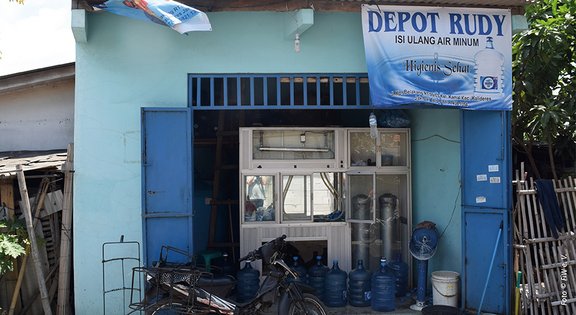Integrated resource management in Southeast Asia
Urban-NEXUS concept for sustainable wastewater collection and treatment in Jakarta
Since 2016, the FiW has been advising various individual measures in the Urban-NEXUS programme of the United Nations Economic and Social Commission for Asia and the Pacific (UN-ESCAP), which is led by GIZ. We support the development of practical solutions in the areas of wastewater collection and treatment in urban districts of Jakarta (Indonesia) and in the cities of Korat and Chiang Mai (Thailand). The main focus of the Urban-Nexus programme is the promotion of municipal administrative bodies in participating partner cities. The NEXUS approach supports the identification of possible synergies between water, energy and food security, which are the most important sectors for livelihood provision.
On behalf of the Rockefeller Foundation's "100 Resilient Cities" programme, GIZ is advising the Jakarta city government, which is one of 100 cities in Southeast Asia being promoted to increase resilience or stress resistance. In the period from February to March 2018, our colleague Dr.-Ing. Kirchhof was in the West Jakarta area to analyse the current water management status of a small residential area with a lack of water supply and wastewater disposal. As an expert in the Indonesian language, he was able to make an analysis of the needs of the population in discussions with various administrative bodies and residents. Based on this analysis, a team of the FiW senior experts was able to design a concept for sustainable and integrating wastewater collection and treatment. As an expert in the Indonesian language, he was able to make an analysis of the needs of the population in discussions with various administrative bodies and residents. Based on this analysis, a team of FiW senior experts was able to design a concept for sustainable and integrating wastewater collection and treatment. The concept, including a cost estimate, was presenter to the city administration in Jakarta.
The environmental situation in the Cambela study area is critical. There is no public water supply. Drinking water is currently provided by private initiatives that distribute water through water kiosks and push-cart services. Public tankers from the neighbouring town of Tangerang and Jakarta deliver the water. Daily consumption is about 30 L per person. Groundwater, which is obtained uncontrollably from numerous domestic wells, is already contaminated by salt water seeping in from the Java Sea as well as sewage seeping in from the surface and septic tank leaks.
A regulated public water supply is essential for the sustainable improvement of living conditions. It was determined that for a functioning water-borne sewage system, a sufficient water supply of approx. 80 L / person / day must first be ensured. For this reason, a pipeline network was planned for water supply, with the requirement to implement a 10 km long long-distance pipeline from Tangerang.
As a sewerage system, a combination of gravity-driven sewers with vacuum sewers from individual small residential quarters was proposed. Besides an improved water supply, the requirements for this technically feasible solution would be the implementation of a compulsory connection of the house connections to the collector pipes.
A multi-stage process was recommended as a suitable wastewater treatment concept. This consists of a curved screen to separate coarse material, an anaerobic reactor with the option to produce biogas, an aerobic trickling filter and a sedimentation tank. The possibility of water reuse for urban irrigation was demonstrated. The shape and size of the reactors were planned in such a way that the capacity of the treatment plant can be doubled by optimising the reactors and modifying the operating mode. Thus, the system can be adapted to the hoped-for water consumption of at least 80 L / person / day.
Furthermore, it was recommended to strengthen the responsible institutions and to support accompanying measures, especially the training of operation and maintenance of the technical equipment as well as cleaning and repair of the sewer network, and to involve the neighbourhood residents in the training.






